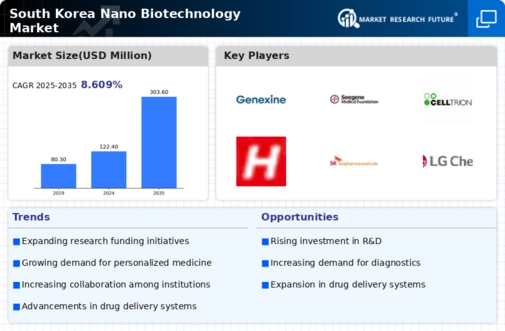Advancements in Nanomaterials
The development of advanced nanomaterials is a crucial driver for the nano biotechnology market in South Korea. These materials exhibit unique properties that can be harnessed for various applications, including drug delivery, diagnostics, and biosensors. The South Korean government has been actively funding research initiatives aimed at exploring the potential of nanomaterials, with investments reaching upwards of $200 million in recent years. This influx of funding is expected to accelerate innovation and commercialization within the nano biotechnology market. Furthermore, the integration of nanomaterials into existing healthcare frameworks could lead to more efficient diagnostic tools and therapeutic agents, thereby enhancing patient outcomes and driving market growth.
Regulatory Support for Innovation
The regulatory environment in South Korea is evolving to support innovation within the nano biotechnology market. Recent initiatives by the government aim to streamline the approval processes for new nanotechnology-based products, thereby reducing time-to-market for innovative therapies and diagnostics. This regulatory support is crucial for fostering a conducive environment for research and development. As companies navigate the regulatory landscape more efficiently, they are likely to invest more heavily in the nano biotechnology market. The anticipated growth in product approvals could lead to a surge in market activity, as new entrants and established firms alike seek to capitalize on the opportunities presented by a more favorable regulatory framework.
Rising Demand for Targeted Drug Delivery
The increasing prevalence of chronic diseases in South Korea is driving the demand for innovative therapeutic solutions. The nano biotechnology market is poised to benefit from this trend, as nanoparticles can be engineered to deliver drugs directly to targeted cells, minimizing side effects and enhancing treatment efficacy. According to recent estimates, the market for targeted drug delivery systems is expected to grow at a CAGR of approximately 15% over the next five years. This growth is indicative of a broader shift towards personalized medicine, where treatments are tailored to individual patient profiles. As healthcare providers seek more effective treatment modalities, the nano biotechnology market is likely to see heightened interest and investment, further propelling its expansion in the region.
Growing Focus on Environmental Sustainability
There is a notable shift towards environmentally sustainable practices within the nano biotechnology market. South Korea is increasingly prioritizing green technologies, which has led to the exploration of biodegradable nanoparticles and eco-friendly manufacturing processes. This focus on sustainability is not only beneficial for the environment but also aligns with consumer preferences for greener products. As a result, companies operating in the nano biotechnology market are likely to invest in research that emphasizes sustainable practices. The potential for eco-friendly applications could open new avenues for growth, as the market adapts to meet both regulatory requirements and consumer demand for sustainable solutions.
Increased Collaboration in Research Initiatives
Collaborative efforts between research institutions and private enterprises are becoming more prevalent in South Korea's nano biotechnology market. These partnerships facilitate the sharing of knowledge, resources, and expertise, which can accelerate the development of innovative products and technologies. For instance, joint ventures between universities and biotech firms have led to breakthroughs in nanomedicine and diagnostics. Such collaborations are expected to enhance the competitive landscape of the nano biotechnology market, as they enable faster translation of research findings into practical applications. This synergy not only fosters innovation but also strengthens the overall ecosystem, positioning South Korea as a leader in the nano biotechnology sector.
















